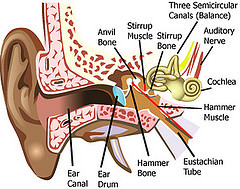Every year my relatives and I attend a stock car race at the Michigan International Speedway. Some of us rent scanners and headphones so we can listen to drivers and the race. Those who do not wear headphones pull out earplugs and share. However, this means not everyone is wearing ear protection at all times, including me. I wear the headphones but half way through the race I notice they become heavy, tight, and my head is sweating. So I take them off for a while – but I do not always put in ear plugs. I take my hearing for granted not realizing that this natural asset impacts my wellbeing and quality of life. So I did a little digging about hearing – take a moment to hear about what I have learned.
Thirty six million Americans are currently affected by the U.S.’s third most common health problem – hearing loss. Your heard me – hearing loss. Protecting one of your most valuable natural assets is important because hearing loss is often permanent.
Hearing loss can occur at any age for several reasons:
- Ear infections
- Trauma
- Exposure to loud noises
- Harm to the inner ear and ear drum
- Illness
- Certain medications
- Advanced age or genetics
Noise affects people differently; the volume levels and length of the sound of various sources can affect our hearing. Sensitive structures in the inner ear can be damaged when sounds are too loud, even for a brief time, or when they are both loud and long-lasting. A sound’s loudness is measured in decibels . A normal conversation and background music is around 60 decibels. Sounds above 85 decibels – depending on protection, the amount of exposure from the sound, and the length of the sound – are harmful.
Prevention is the key:
Avoid or move away from loud noises.
Cross the street to get away from loud construction or cover your ears around speakers in ball parks or gymnasiums.
Wear ear protection.
Hearing protectors such as earplugs and ear muffs reduce the loudness of sounds. Wear the protectors when sounds are as loud or louder than traffic – this includes lawn mowers, gunfire, stock car races, hand drills, school dance, loud rock concert, motorcycles, and jet engines – to name a few. Remember to wear the protection the whole time you are exposed to the noise.
- Ear protection can be custom made to fit your ear .
- Ear muff protection is available for babies and toddlers. Ear muffs are easier to keep track of than ear plugs which can also be a choking hazard.
- Ear muffs are also available for animals! Mutt Muffs are ear muffs for dogs that are a “passive noise-reducing device” .
Talk to you employer about hearing safety.
Ears are exposed to dangerous noise levels every day in some work places such as agriculture, manufacturing, military, mining, and transportation. To learn more about work safety guidelines in place for hearing protection contact the Occupation Safety & Health Administration (OSHA).
Turn down the volume.
Reduce the noise from the stereo, television, car radio, and personal listening devices with ear buds and earphones. Children should be monitored closely when it comes to sound systems – hearing plays a major role in a child’s learning, and speech and language development.
Stop smoking.
A link between smoking and hearing loss has been established therefore you are more likely to have hearing loss if you smoke.
Eat a healthy diet.
Good nutrition has been associated with healthy hearing and hearing preservation. Nutrients such as vitamins A and B Complex have been known to help prevent hearing loss. Antioxidants and vitamins C, D, and E are also effective in increasing circulation of the ear and benefiting the hearing function. Minerals such as magnesium and potassium promote a healthy nervous system which enhances the auditory system. Research has also shown that poor nutrition is connected to hearing loss. A diet high in sugar, carbohydrates, and cholesterol negatively impacts hearing.
When it comes to communication, relationships and quality of life – hearing plays an important role. If you already have some noise-related hearing loss it is not too late to preserve the hearing you still have. I am going to be much more diligent in wearing ear protection come August when I attend another stock car race with my relatives. Now…I hope my relatives will hear this and join me in consistently protecting our hearing. So, you heard me – protect your hearing.
Links for great information!!
To learn more about ear protection devices such as swim plugs, hearing protection molds, and custom listening molds click on the Ohio State University link http://hearing.osu.edu/8588.cfm.
Click on the link for an on-line hearing test – headphones needed http://www.hear-it.org/Online-Hearing-Test.
Interested in a hearing screening? Click on this link http://webportal.audiology.org/Custom/FindAnAudiologist.aspx to find an audiologist near you.



